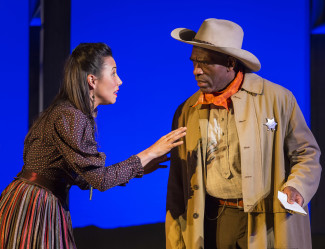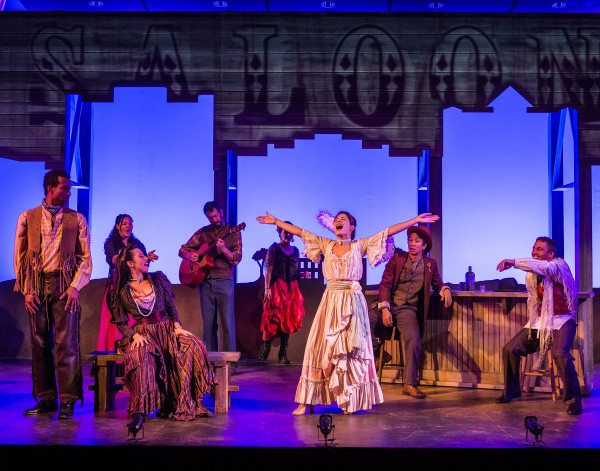INTERVIEW: Reinholz sheds light on American Indian boarding schools in new play

In Los Angeles, bordered by mountains and highways, is the beautiful gem of a museum known as the Autry. The national center attempts to understand and document the various cultures of the American West, and its Native Voices theatrical series presents engaging work by Native American, Alaska Native and First Nations playwrights.
Through March 15, Native Voices at the Autry presents Off the Rails by Randy Reinholz (Choctaw), professor at San Diego State University. The play is loosely based on William Shakespeare’s Measure for Measure, one of the Bard’s most famous comedies. This time the action is set in the Old West and covers the topic of American Indian boarding schools. The characters reside in Genoa, Neb., a fictional town on the frontier. It’s here where we meet Momaday (Shaun Taylor-Corbett), who has been sentenced to death for impregnating an Irish girl.
“I’m a university professor, among other things, and I like working with Shakespeare and sort of treating it as a new play,” Reinholz said recently during a phone interview. “I’ve always wanted to work with Measure for Measure. It’s something I worked on in grad school and have enjoyed through the years.”
The playwright said the production covers an “uncomfortable” chapter in American history, bringing the reality of these boarding schools to the audience at the Autry. “The common estimate is about 15-30 million Indian people in the United States at the point of contact. So we go with 15 [million] as a low number to be accurate, and by the time the play takes place, we’re down to 220,000. And L. Frank Baum, the author of The Wizard of Oz, and a number of newspaper people in the West were calling for the final push to exterminate the last American Indians, and then there’s some very eloquent writing about why we should go ahead and exterminate all the rest of the Indians. And the boarding school period became a benevolent choice to fulfill the model of the school, which was to kill the Indian but save the man. … Looking at that through today’s lens, it was an absolute muscular effort of cultural genocide, and it’s one of those things that as a country I think we just don’t have the courage to look at until the … the Vietnam War era perhaps.”
Reinholz said the boarding school system, which included examples of corporal punishment, continued for 50 years and had huge ramifications for the American Indians. “We still get people who see the play who come up afterward and say, ‘But that didn’t actually happen, right?’ Or, ‘Oh, that was just that one year of the play and then everything worked out fine?’ Because it’s a comedy, so I have things work out well in the story. It’s like, no, it went on for 50 years, and we’re really uncovering the trauma and trying to deal with the trauma. So the idea of doing the play is to tell the story as the first step of understanding the drama and then how do we get past it.”

Native Voices, headed by Reinholz and Jean Bruce Scott as producing artistic directors, tries to couple entertainment with education in its exploration of themes and appreciation for voices sometimes not heard on the mainstream stages across the United States. It’s a place for identity and history, understanding and contemplation.
“Our bias often is that the education outweighs the entertainment, and this is an experiment for Native Voices. We’re really going for entertainment with this particular piece,” he said. “So there’s a very touching scene right at the end of Act I where there’s a very heated discussion about what it means to be traditional, and what it means to be Christian, and who’s going to take on which role, and what that’s going to cost or benefit the people as a whole. And we don’t pull any punches, and we certainly don’t say which is right. But it’s a tough scene, even in a comedy.”
Off the Rails is a learning process even for the actors on stage. Reinholz said they walk away with “empowerment,” particularly for the native actors. Off the Rails is the capstone of an entire year where Native Voices attempted to understand the boarding school system and its implications.
“I think it’s really good for people who are activists to strongly consider how people can hear information, and again this play airs on the side of entertainment,” Reinholz said. “So you’ve got a lot of people thinking about, well, this stew is the United States and how we came together. For me, it’s not so much the horror of having killed all those people and the very frank discussion to kill the rest of them. I think it’s a miracle that we didn’t kill them all as a country. I just think, wow, there’s something to celebrate in that.”
The playwright said the adaptation, which is gaining interest from major theater companies, is approximately 20 percent Shakespeare and 80 percent invention.
“It’s not all in iambic [pentameter] because Shakespeare’s characters are all speaking in prose, particularly the clowns and in the bawdy scenes,” he said. “So that all feels like regular prose, but there are Shakespeare themes woven into much of the play. So the kids coopt lines from Romeo & Juliet, the young lovers. The woman who’s running the bar compares herself to Gertrude in Hamlet, so there’s all these coopting of lines. And that really comes from a very Deadwood kind of approach to the work. These people, their aspirational literature in the Old West would have been the King James Bible and a Collected Works of Shakespeare, so they would have been imitating those speech patterns.”
After raising enough funds for the Native Voices production — a campaign that included $20,000 in donations through Indiegogo — Reinholz said he’s hopeful the play will live on. “That was really our hope is to make something that colleges could look at and think about using it as a teaching tool, both to teach the history and the language and the performance value,” he said. “It just seems to be resonating. It’s because of this company that’s really supported the whole project from the beginning and really just threw themselves into it.”
By John Soltes / Publisher / John@HollywoodSoapbox.com
- Off the Rails, part of the Native Voices initiative at the Autry in Los Angeles, continues until March 15. Click here for more information.

